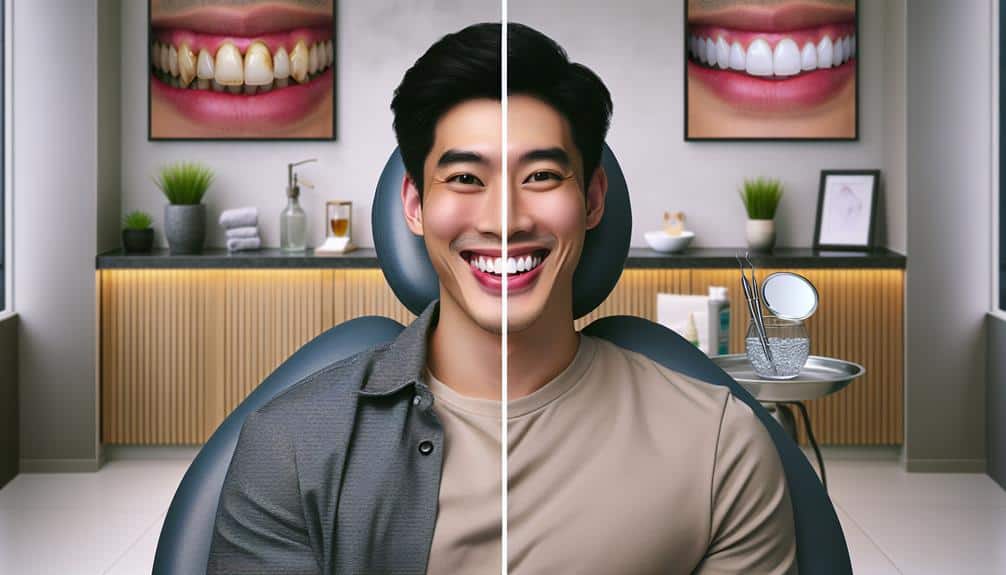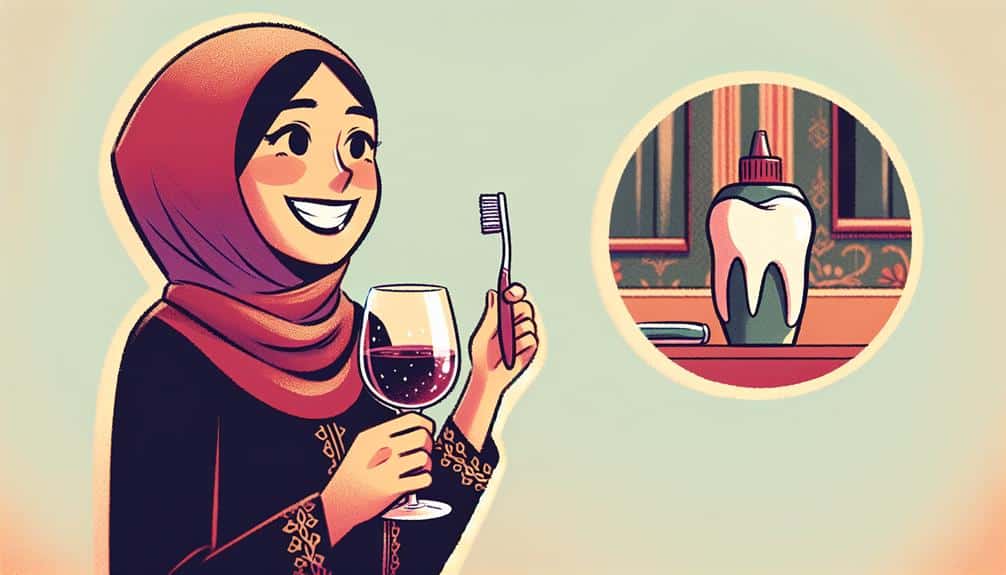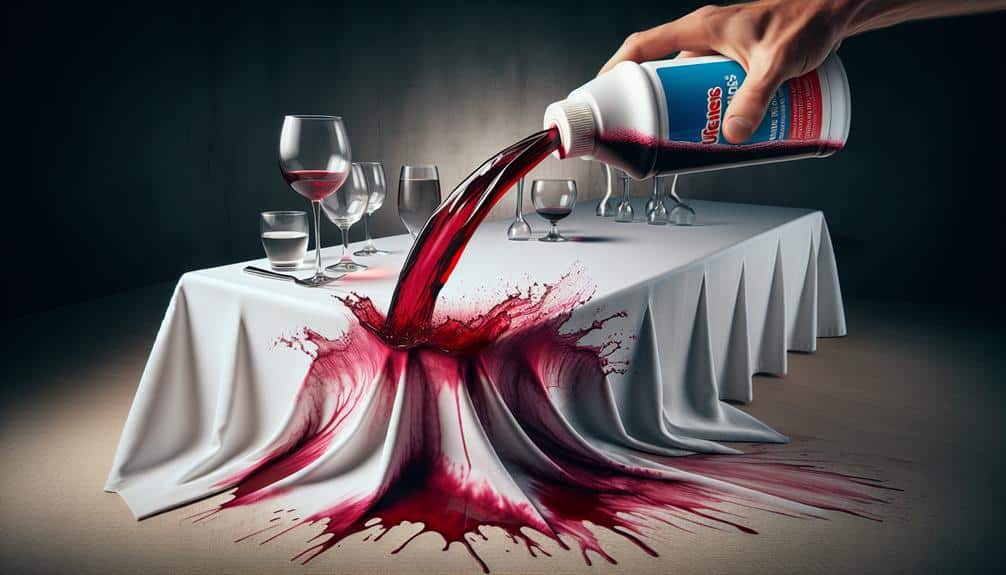By adjusting your diet to include antioxidant-rich foods and staying hydrated, you protect your teeth from wine stains. Ideal oral hygiene habits and quitting smoking also play a vital role in stain prevention. These lifestyle changes enhance your dental health, creating a shield against wine-induced discoloration.
Key Points
- Antioxidants in diet combat free radicals that cause stains.
- Polyphenols from foods protect enamel against wine stains.
- Hydration aids saliva production to rinse away wine residues.
- Good oral hygiene prevents the formation of wine stains.
- Lifestyle changes like quitting smoking reduce teeth discoloration.
Diet Choices for Stain Prevention
To prevent wine stains, consider incorporating foods rich in antioxidants and polyphenols into your diet. These components offer significant antioxidant benefits and aid in enamel protection. Antioxidants such as vitamin C, vitamin E, and beta-carotene help combat the free radicals that can lead to staining on your teeth. Polyphenols, found in foods like berries, dark chocolate, and green tea, not only contribute to enamel protection but also possess anti-inflammatory properties that can benefit your overall oral health.
Including foods like apples, carrots, and celery in your diet can also assist in stain prevention. These crunchy fruits and vegetables act as natural abrasives, gently scrubbing away surface stains on your teeth. Additionally, they stimulate saliva production, which helps neutralize acids and maintain the pH balance in your mouth, reducing the likelihood of stains forming.
Hydration Impact on Stains
Consider the impact of hydration on preventing stains caused by wine consumption. Adequate water consumption plays a vital role in enhancing stain resistance in the context of wine stains. Here are five key points to understand the relationship between hydration and stain prevention:
- Hydration Level: Maintaining ideal hydration levels guarantees that saliva production remains at a sufficient level, aiding in the prevention of wine stains.
- Saliva Composition: Adequate water intake helps in maintaining the proper composition of saliva, which contains enzymes that can break down wine pigments before they adhere to teeth.
- Rinsing Action: Drinking water alongside wine can help rinse away wine residues and reduce the time wine pigments have to settle on the teeth.
- Tooth Enamel Protection: Hydration supports the integrity of tooth enamel, which is essential for resisting the penetration of wine pigments into the teeth.
- Overall Oral Health: Good hydration is linked to overall oral health, which can contribute to better stain resistance and prevention.
Maintaining adequate water consumption can significantly enhance your ability to resist wine stains and protect your oral health.
Oral Hygiene Habits for Prevention
Maintaining consistent oral hygiene practices is essential for effectively preventing wine stains and promoting overall dental health. To prevent wine stains, focus on your brushing habits and flossing routine. Brushing your teeth at least twice a day with a fluoride toothpaste helps remove plaque and stains caused by wine. Make sure you use a soft-bristled toothbrush and brush gently in circular motions to avoid damaging your enamel. Pay special attention to the areas where stains commonly occur, such as the front teeth.
In addition to brushing, incorporating a flossing routine into your daily oral care regimen is important. Flossing helps remove food particles and plaque from between your teeth, where a toothbrush can't reach. This reduces the chances of wine pigments adhering to your teeth and causing stains. Be sure to floss at least once a day, gently guiding the floss between each tooth and hugging the sides to remove debris effectively.
Foods That Worsen Stains
Focusing on your dietary choices is key to understanding which foods can exacerbate wine stains on your teeth. Certain foods can contribute to the staining of your teeth, making the impact of wine stains more pronounced. To minimize the effects of these foods, consider the following:
- Dark Berries: Berries like blueberries and blackberries contain intense pigments that can stain your teeth, especially when consumed frequently.
- Curry: The vibrant color of curry may make it a delicious addition to your meals, but it can also contribute to teeth staining over time.
- Soy Sauce: Its deep color and high acidity can lead to teeth discoloration, particularly if consumed in large amounts.
- Balsamic Vinegar: This flavorful condiment can also darken your teeth due to its deep hue and acidic nature.
- Coffee and Tea: Regular consumption of coffee and tea, especially black varieties, can gradually stain your teeth, enhancing the effects of wine stains.
Being mindful of these stain-inducing foods and moderating their intake can help in maintaining a brighter smile even when enjoying beverages like wine.
The Role of Smoking
Smoking greatly contributes to the discoloration of teeth, heightening the effects of wine stains over time. The tar and nicotine found in cigarettes not only lead to yellowing of the teeth but also create a rough surface on the enamel, making it easier for pigmented molecules from wine to adhere and penetrate the tooth structure. This process accelerates the staining effect of wine, causing deep-seated discoloration that's challenging to remove.
To combat the impact of smoking on teeth staining, smoking cessation is vital. By quitting smoking, you can prevent further discoloration and allow your teeth to begin the process of natural whitening. Additionally, adopting oral hygiene practices such as regular brushing, flossing, and using whitening toothpaste can help improve stain resistance.
Frequently Asked Questions
How Do Different Types of Wine Affect Stain Formation on Teeth?
Different types of wine, like red and white, vary in staining factors affecting tooth discoloration. Red wine, rich in chromogens, tannins, and acidity, exhibits higher potential for stains compared to white wine with lower chromogens and acidity levels.
Can Certain Medications Contribute to the Severity of Wine Stains?
Medication impact on wine stains can vary, but lifestyle changes could help. Your dental hygiene routine, like brushing and flossing, can prevent these stains. Think of it like armor; a shield against wine's staining effects.
Are There Any Natural Remedies or DIY Solutions for Removing Wine Stains From Teeth?
To combat tooth discoloration from wine, try natural remedies first. DIY solutions like baking soda paste or hydrogen peroxide rinse can help. Lifestyle changes such as reducing wine intake and improving oral hygiene are effective in preventing stains.
What Role Do Genetics Play in the Susceptibility to Wine Stains?
Genetic predisposition can influence your susceptibility to wine stains, impacting how easily they form on your teeth. However, lifestyle habits, like regular dental care and avoiding dark beverages, can help prevent these stains from becoming prominent.
How Do Environmental Factors, Such as Air Pollution, Affect the Likelihood of Developing Wine Stains?
Influence of environmental factors like air pollution on wine stain development can be significant. Weather conditions, lifestyle choices, diet, and oral hygiene play roles. For example, reducing exposure to pollutants can help prevent staining.



